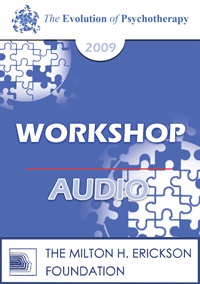
- Average Rating:
- Not yet rated
- Topic Areas:
- Workshops | Focusing | Psychotherapy
- Categories:
- Evolution of Psychotherapy | Evolution of Psychotherapy 2009
- Faculty:
- Eugene Gendlin, PhD
- Duration:
- 2 Hours 37 Minutes
- Format:
- Audio Only
- Original Program Date:
- Dec 10, 2009
- Short Description:
- Dr. Gendlin will work with volunteers from the audience to show how to find “Focusing.” The physically felt body sense ofa problem is at first unclear and gradually opens and becomes clear. There will be discussion and demonstrations to show how Focusing is used in the context of psychotherapy.
- Price:
- $15.00 - Base Price
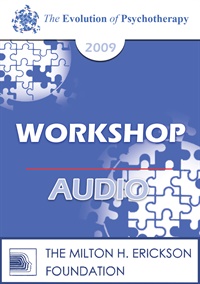
- Average Rating:
- Not yet rated
- Topic Areas:
- Workshops | Dreamwork | Focusing | Meditation, Spirituality and Yoga | Psychotherapy
- Categories:
- Evolution of Psychotherapy | Evolution of Psychotherapy 2009
- Faculty:
- Eugene Gendlin, PhD
- Duration:
- 2 Hours 17 Minutes
- Format:
- Audio Only
- Original Program Date:
- Dec 10, 2009
- Short Description:
- In this experiential workshop, volunteers will be asked to describe a dream in detail and then to work on it with Dr. Gendlin. It is not necessary to tell everything; private space and silent meditation are essential. The use of Focusing will be demonstrated.
- Price:
- $15.00 - Base Price
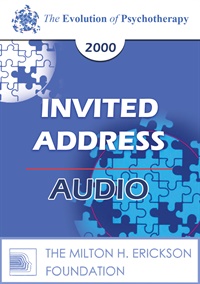
- Average Rating:
- Not yet rated
- Topic Areas:
- Invited Addresses | Focusing | Mind-Body | Psychotherapy
- Categories:
- Evolution of Psychotherapy | Evolution of Psychotherapy 2000
- Faculty:
- Eugene Gendlin, PhD | Jeffrey Zeig, PhD
- Duration:
- 1 Hour 26 Minutes
- Format:
- Audio Only
- Original Program Date:
- May 28, 2000
- Short Description:
- The edge where almost all therapy and thought get stuck is a physical bodily place hardly anyone knows to go into.
- Price:
- $15.00 - Base Price
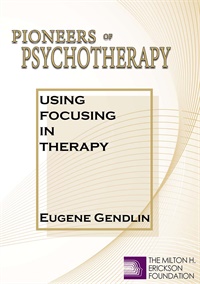
- Average Rating:
- Not yet rated
- Topic Areas:
- Clinical Demonstrations | Trauma | Psychotherapy | Focusing | Mind-Body
- Bundle(s):
- Pioneers of Psychotherapy Bundle
- Categories:
- Pioneers of Psychotherapy | Evolution of Psychotherapy | Evolution of Psychotherapy 2000
- Faculty:
- Eugene Gendlin, PhD
- Course Levels:
- Master Degree or Higher in Health-Related Field
- Duration:
- 00:54:00
- Format:
- Audio and Video
- Original Program Date:
- May 27, 2000
- Short Description:
- Eugene Gendlin (2000) demonstrates with two volunteers. The first is guided through feelings of tension in her shoulders and shakiness in her stomach. Gendlin conducts a second demonstration. The next volunteer presents the trauma of a hysterectomy due to cancer. Gendlin concludes with an explanation of his method.
- Price:
- $59.00 - Base Price
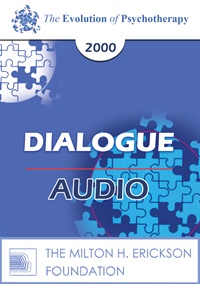
- Average Rating:
- Not yet rated
- Topic Areas:
- Psychotherapy | Dialogues | Therapeutic Relationship | Therapist Development
- Categories:
- Evolution of Psychotherapy | Evolution of Psychotherapy 2000
- Faculty:
- Albert Ellis, PhD | Eugene Gendlin, PhD
- Duration:
- 55 Minutes
- Format:
- Audio Only
- Original Program Date:
- May 27, 2000
- Short Description:
- EP00 Dialogue 02 - The Therapeutic Relationship - Albert Ellis, Ph.D., and Eugene Gendlin, Ph.D. Given a topic, to become aware of the differing approaches to psychotherapy, and to identify the strengths and weaknesses in each approach. Moderated by Ellyn Bader, Ph.D.
- Price:
- $15.00 - Base Price
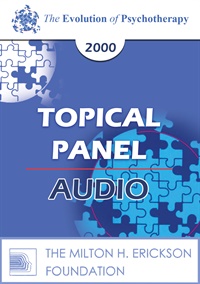
- Average Rating:
- Not yet rated
- Topic Areas:
- Topical Panels | Mind-Body | Psychotherapy
- Categories:
- Evolution of Psychotherapy | Evolution of Psychotherapy 2000
- Faculty:
- Eugene Gendlin, PhD | Alexander Lowen, MD | Ernest Rossi, PhD | Francine Shapiro, PhD
- Duration:
- 55 Minutes
- Format:
- Audio Only
- Original Program Date:
- May 27, 2000
- Short Description:
- Topical Panel 02 - Mind-Body Issues Featuring Eugene Gendlin, PhD, Alexander Lowen, MD, Ernest Rossi, PhD, and Francine Shapiro, PhD. Moderated by Bernhard Trenkle, Dipl. Psych.
- Price:
- $15.00 - Base Price
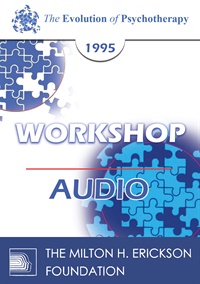
- Average Rating:
- Not yet rated
- Topic Areas:
- Workshops | Dreamwork | Focusing | Meditation, Spirituality and Yoga | Psychotherapy
- Categories:
- Evolution of Psychotherapy | Evolution of Psychotherapy 1995
- Faculty:
- Eugene Gendlin, PhD
- Duration:
- 2 Hours 47 Minutes
- Format:
- Audio Only
- Original Program Date:
- Dec 17, 1995
- Short Description:
- In this experiential workshop, volunteers will be asked to describe a dream in detail and then work on it with Dr. Gendlin. It is not necessary to tell everything; private space and silent meditation are essential. The use of Focusing will be demonstrated.
- Price:
- $15.00 - Base Price
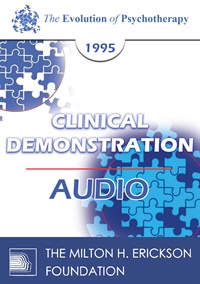
- Average Rating:
- Not yet rated
- Topic Areas:
- Clinical Demonstrations | Psychotherapy | Focusing
- Categories:
- Evolution of Psychotherapy | Evolution of Psychotherapy 1995
- Faculty:
- Eugene Gendlin, PhD
- Duration:
- 1 Hour
- Format:
- Audio Only
- Original Program Date:
- Dec 16, 1995
- Short Description:
- Educational Objectives: To describe the use of focusing within a therapy hour, within relating and listening, and to describe when and how one would use it. To describe how a step from focusing is likely to differ recognizably from other therapy events.
- Price:
- $15.00 - Base Price
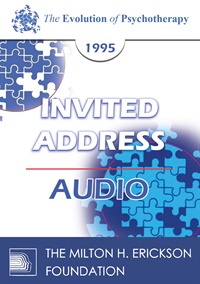
- Average Rating:
- Not yet rated
- Topic Areas:
- Invited Addresses | Focusing | Mind-Body | Psychotherapy
- Categories:
- Evolution of Psychotherapy | Evolution of Psychotherapy 1995
- Faculty:
- Eugene Gendlin, PhD | James Hillman, PhD
- Duration:
- 1 Hour 27 Minutes
- Format:
- Audio Only
- Original Program Date:
- Dec 16, 1995
- Short Description:
- Focusing is bodily attention, not to mere sensations but to an at first unclear, implicitly complex bodily sense-of a situation, problem, or aspect of life. Therapy deepens immediately with many clients if asked what physical sense comes in the middle of the body in relation to what is being worked on. With half a minute of repeated direct attention, clients can assign a "quality-word," e.g., "heavy," "fluttery," or "tight." Then small steps come to say the crux of the problem. Each brings a slight (later large) "shift" and release, a direct sense of validity, although further steps may again change the whole problem.
- Price:
- $15.00 - Base Price
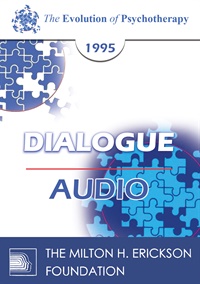
EP95 Dialogue 02 - New Approaches to Creative Psychotherapy - Eugene Gendlin, PhD; Ernest Rossi, PhD
- Average Rating:
- Not yet rated
- Topic Areas:
- Dialogues | Psychotherapy | Art and Creativity
- Categories:
- Evolution of Psychotherapy | Evolution of Psychotherapy 1995
- Faculty:
- Eugene Gendlin, PhD | Ernest Rossi, PhD
- Duration:
- 1:01:13
- Format:
- Audio Only
- Original Program Date:
- Dec 15, 1995
- Short Description:
- Dialogue 02 from the Evolution of Psychotherapy 1995 - New Approaches to Creative Psychotherapy, featuring Eugene Gendlin, PhD; and Ernest Rossi, PhD.
- Price:
- $15.00 - Base Price
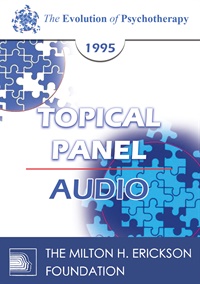
- Average Rating:
- Not yet rated
- Topic Areas:
- Topical Panels | Psychotherapy | Research
- Categories:
- Evolution of Psychotherapy | Evolution of Psychotherapy 1995
- Faculty:
- Eugene Gendlin, PhD | Lynn Hoffman, ACSW | Donald Meichenbaum, PhD | Francine Shapiro, PhD
- Duration:
- 57 Minutes
- Format:
- Audio Only
- Original Program Date:
- Dec 15, 1995
- Short Description:
- Panel 08 from the Evolution of Psychotherapy 1995 - Psychotherapy Research Featuring Eugene Gendlin, Ph.D.; Lynn Hoffman, A.C.S.W.; Donald Meichenbaum, Ph.D.; and Francine Shapiro, Ph.D. Moderated by W Michael Munion, MA.
- Price:
- $15.00 - Base Price
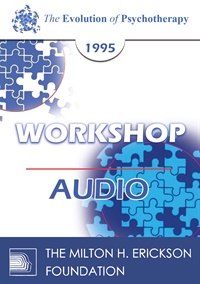
- Average Rating:
- Not yet rated
- Topic Areas:
- Workshops | Focusing | Meditation, Spirituality and Yoga | Psychotherapy
- Categories:
- Evolution of Psychotherapy | Evolution of Psychotherapy 1995
- Faculty:
- Eugene Gendlin, PhD
- Duration:
- 2 Hours 50 Minutes
- Format:
- Audio Only
- Original Program Date:
- Dec 14, 1995
- Short Description:
- This experiential workshop will begin with a guided silent meditation. Gendlin will work with volunteers from the audience to show how to find "Focusing." The physically felt body sense of a problem is at first unclear and gradually opens and becomes clear. There will be discussion and demonstrations to show how Focusing is used in the context of psychotherapy.
- Price:
- $15.00 - Base Price

